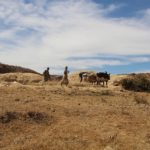How to Avoid White Savior Syndrome

Whatever your destination, I’d wager that some of you are driven by the desire to create a positive impact in the world. Your intentions are for social good, but are they socially conscious? Social consciousness is the awareness of problems and inequities facing a society, where one feels a sense of responsibility to address them from a place of mindfulness. Are you conscious of the impact of Western perceptions on developing nations? Of white savior syndrome?
Are you conscious of your own unearned advantages in the world? Before you get busy folding techwick clothes and shoving anti-malarial pills into your backpack, let’s shed some light on the shadowy side of good intentions.
Good intentions are not always socially conscious at their core. In fact, white people’s intentions in developing nations often manifest as varying degrees of paternalism and ‘white saviorism’. White saviorism is the belief that white people can enlighten underprivileged communities; it exudes a “we know best” narrative of a dominant culture.

Unfortunately this isn’t just political or corporate structures. This is also travelers imposing Western belief systems and taking actions that feed their ego.
I bounced around from volunteer assignment to assignment, and in each one I interjected my own opinions, thinking I alone could dream up “fixes” to various challenges.
The idea that local communities need Western assistance to thrive is a legacy of colonialism. Colonialism: a jagged scar of oppression that has never fully healed. We continue to live in its shadow with stories told by mainstream media, politics, peer and social groups... a constant barrage of conditioning for our mindset.
Conscious intention means that we are aware of our mindset and motivations at the deepest level and remain inquisitive and open. We accept that we have been conditioned and delve deeper. In a development setting, these intentions understand the value of the voice of indigenous and underrepresented groups, and drive a person to remain vigilant of their own privilege. Without conscious intentions in overseas travel, work, and volunteerism, the world continues to be susceptible to the spread of white saviorism.
In my work across Africa, Asia, and Central America, I often witnessed a paternalist mindset dominating aid and development. Many programs and organizations are held hostage by political and religious agendas as well as patriarchal structures that value top-down approaches to field work. In fact, as a greenhorn aid worker in Uganda, I was guilty of this trap.
I bounced around from volunteer assignment to assignment, and in each one I interjected my own opinions, thinking I alone could dream up “fixes” to various challenges.
My mindset was way off.
My mindset was way off. Making the shift from good intentions to conscious intentions begins with reprogramming our mindset. Change your mindset and you shift how you interact with the world around you. Conscious intentions are nurtured by a mindset that respects the sovereignty of communities and strives for not only inclusiveness, but also their mentorship and leadership.
Years ago, I sat on a couch across from two Armenian womxn who were survivors of sex trafficking. These womxn are incredibly resilient; they rewrote their stories through their own volition and with support of their people, not the arrival of a paternalist “white knight.”
Both were making a livelihood stitching beautiful lace; they had married twins and had babies. Community networks and Armenian staff were integral to identifying and supporting these womxn and others.
How you show up to the world during your travel and volunteerism matters.
If an international organization had tried to provide assistance without local leadership, these womxn would have been at a greater risk of harm. Acknowledging and understanding that we, the West, don’t inherently know better (and can actually cause more harm) is an integral step to becoming a better global citizen.
How you show up to the world during your travel and volunteerism matters. It has a ripple effect. So aim for supporting sustainable impact that is deeply rooted in local wisdom and leadership. Healing ourselves and building social consciousness is a journey.
The following are powerful exercises that have healed and lifted my own social consciousness throughout my personal and professional journey.
How to Avoid White Savior Syndrome
Embrace the Un-Doing
Sometimes the “doing” is “un-doing.” What most people don’t realize is that inequitable systems and practices are sneaky and subtle. Conditioning works at our most subconscious levels and it becomes automated action. We are all guilty of doing unintentional harm. Reflecting on my earlier aid work days, I can see now the little things I had done to undermine local people.
By doing the work to understand what we subconsciously believe and why we act in certain ways, we become more conscious of how we move through the world. Do the work to undo your own bias.
This will be lifelong work. It’s a marathon. But you can start by pushing yourself to face your own fragility and defensiveness in how you have played into white saviorism. I highly recommend the book White Fragility: Why it’s So Hard for White People to Talk About Racism, by Robin DiAngelo.
How to Avoid White Savior Syndrome.
Don’t let your ego drive
While traveling provides endless opportunities for personal growth, it also creates ego-fueled acts of service. It’s OK to help others because it makes you feel good. What we can do is be mindful that the ego thrives on performative acts of service.
One way the ego loves to show up is through social media. These days, social media is constantly nourishing the ego. People posting acts of service to get attention. So check in to see if your ego is driving your actions.
Adopt an empathetic and empowerment mindset
Brene Brown made this awesome video on the difference between empathy and sympathy. The tendrils of relatability are fragile in this world, but we can nurture them through constant acts of empathy. Empathy will give you a lens to support empowered action, rather than top-down approaches.
Embracing an empowerment mindset works to dismantle inequitable power dynamics. It opts for power-with people, not power-over, and centers on the voices of communities and marginalized groups, not on one’s own voice and input. It listens to learn. This mindset acknowledges and amplifies the wisdom of indigenous leaders as instrumental actors in the journey for sustainable impact.
The world needs more womxn who want to become changemakers. Womxn who will step forward to dismantle the spread of paternal white saviorism and work in true partnership with local communities.
So go for it. When you commit to great inner shifts, the outer world will mirror your impact. You’ve got this.
“Never doubt that a small group of thoughtful, committed citizens can change the world; indeed it is the only thing that ever has.”-Margaret Mead
This article was originally post on January 25, 2019 on Pink Pangea. Photo credits for How to Avoid White Savior Syndrome by Unsplash and Pixabay.









Look at my cover photo. Could you tell me if it qualifies? It’s not my accomplishment yet there I am. Hi world, I helped this boy. Ok. I just answered my own question! Thank you!
this website copied your article https://doctorfarrah.com/2020/11/12/white-saviorism/
Thank you, we will look into it and report them.